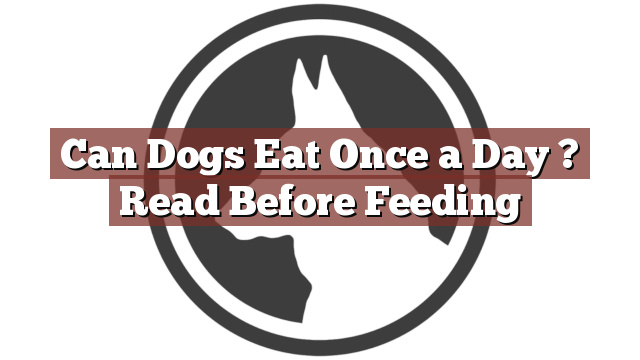Understanding Your Dog’s Dietary Needs
Proper nutrition is essential for the health and well-being of our beloved furry friends. As responsible pet owners, it is crucial to understand our dog’s dietary needs to ensure they receive the right balance of nutrients. Dogs, like humans, require a variety of essential nutrients, including proteins, carbohydrates, fats, vitamins, and minerals, to thrive. The specific requirements may vary depending on factors such as breed, age, size, activity level, and overall health condition.
Can Dogs Eat Once a Day? Read Before Feeding
Can dogs eat once a day? This is a common question among dog owners, and the answer is both yes and no. While some dogs can handle eating once a day without any issues, it is not suitable for every dog. It is important to consider various factors before deciding on the feeding schedule for your furry friend.
Pros and Cons of Feeding Dogs Once a Day
Feeding your dog once a day can have both advantages and disadvantages. One of the main benefits is convenience. It can be easier for pet owners to manage their dog’s feeding routine when it is limited to one meal a day. Additionally, some dogs may prefer to eat all their food at once rather than having smaller meals throughout the day.
However, there are potential drawbacks to feeding dogs once a day. Digestive issues can arise if a large amount of food is consumed in a short period. Dogs that eat too fast may be prone to bloating, a potentially life-threatening condition. Additionally, certain breeds, such as those prone to hypoglycemia, may require more frequent meals to maintain stable blood sugar levels. It is crucial to consult with your veterinarian to determine if feeding your dog once a day is appropriate for their specific needs.
Conclusion: Finding the Right Feeding Schedule for Your Dog
In conclusion, finding the right feeding schedule for your dog is essential to ensure their nutritional needs are met while considering their individual circumstances. While some dogs can thrive on one meal a day, it may not be suitable for others. It is crucial to consult with your veterinarian to determine the best feeding schedule for your dog based on their breed, age, size, activity level, and any specific health conditions they may have. By providing them with a balanced and consistent diet, you can help promote their overall health and well-being. Remember, a healthy and happy dog starts with proper nutrition.
Thank you for taking the time to read through our exploration of [page_title]. As every dog lover knows, our furry friends have unique dietary needs and responses, often varying from one canine to another. This is why it's paramount to approach any changes in their diet with caution and knowledge.
Before introducing any new treats or making alterations to your dog's diet based on our insights, it's crucial to consult with a veterinarian about [page_title]. Their expertise ensures that the choices you make are well-suited to your particular pet's health and well-being.
Even seemingly harmless foods can sometimes lead to allergic reactions or digestive issues, which is why monitoring your dog after introducing any new food item is essential.
The content provided here on [page_title] is crafted with care, thorough research, and a genuine love for dogs. Nevertheless, it serves as a general guideline and should not be considered a substitute for professional veterinary advice.
Always prioritize the expert insights of your veterinarian, and remember that the health and happiness of your furry companion come first.
May your journey with your pet continue to be filled with joy, love, and safe culinary adventures. Happy reading, and even happier snacking for your canine friend!

